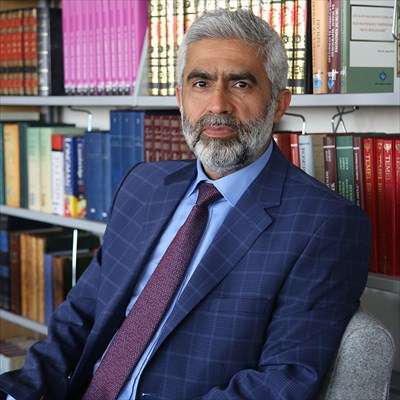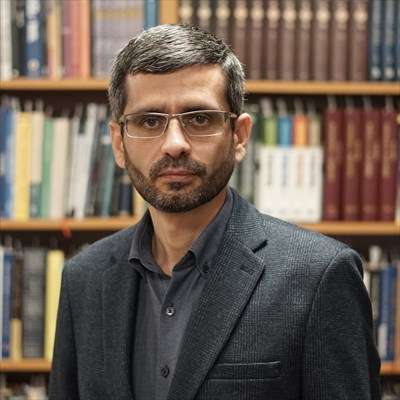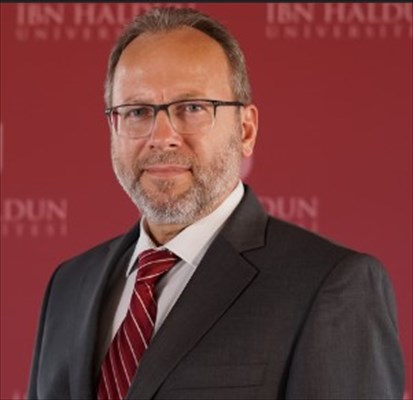


Dr. Bilal Aybakan is the founding dean of the School of Islamic Studies in Ibn Haldun University (IHU). Born in Urfa (1963), Dr. Bilal completed his MA (1990) and PhD (1997) at Marmara University, one of the top departments of Islamic Studies in Turkey. While trained as a Ḥanafī jurist, Dr. Aybakan’s research and teaching focus on Fiqh of al-Muamalat, Uṣūl al-fiqh and history of Shāfiʿī madhhab. He has taught many courses regarding different aspects of Islamic Law in undergraduate and graduate programs for 25 years, and supervised many graduate dissertations. He has written various academic works about different aspects of Islamic Jurisprudence in Turkish and English. Some of his books include “Fulfillment of Obligation in Islamic Law”, “Ijmāʿ in the Formative Period of Islamic Law”; “Imām al-Shāfiʿī and the Formation of the Shāfiʿī School of Law”.

Born in Jordan in 1982, Dr. Hamza Muhammed Wasim Bekri completed his BA (2004) at al-Balqa Applied University, where he graduated from the Department of the Methodology of Religion with honors. He went on to complete his MA and PhD at the University of Jordan’s Department of Hadith. He has published many beneficial articles and works and is currently an assistant professor in the Faculty of Islamic Sciences at Ibn Haldun University. In addition to this, he has taught and continues to teach kalam, aqidah, fiqh, usul al-fiqh, and hadith at such institutions as Istanbul Sultan Ahmet Vakfı, EDEP, ISM, and ISAM.

Issam Eido is a former Visiting Professor of Islamic Studies and Arabic from the University of Chicago Divinity School (2013-2015). Eido's research focuses on the Qur'an in late antiquity, Hadīth Studies, Sufism. His teaching interests focus on Arabic and Islamic Studies. Prior to the Syrian uprising, Eido served as a lecturer in the faculty of Islamic Studies in the Department of Qur'an and Hadīth Studies at the University of Damascus. His doctoral work, 'Early Hadīth Scholars and their Criteria of Hadīth Criticism,' presented a new understanding of the criteria used by Muslim scholars in accepting or rejecting traditions attributed to Muhammad and the transformations of that criteria from the classical to the modern period. While undertaking his doctoral work in the mid-2000s, Eido solidified an international reputation among Islamic and Middle Eastern Studies experts across disciplines by working closely with visiting researchers and Fulbright scholars in Damascus through and Arabic and Islamic studies institute he founded, named the Dalalah Institute. In 2012, he was a Fellow of the "Europe in the Middle East/Middle East in Europe" Research program at the Forum Transregionale Studien in Berlin (affiliated with Corpus Coranicum). Currently, his research focuses on the question of authenticity and authoritative Islamic texts among Muslim scholars in the Islamic formative period.

Abdulhamid Türkmani
Abdul Hamid al-Turkmani was born in Iran in 1983. He studied the islamic sciences at the Dar al-Uloom Karachi in Pakistan graduating in 2006. Amongst his most prominent teachers were Muhammad Rafi' al-'Uthmani, Muhammad Taqi' al-'Uthmani and 'Abd al-Halim al-Chisti al-Nu'mani. He has been working for a number of years as a researcher and a teacher, focusing on the fields of Theology (Kalam), Logic (Mantiq), and Falsafa in various traditional foundations (awqaf) and islamic schools. He has also published critical editions of particular classical texts. Amongst them: Daw'u'l-Ma’ali ‘ala Bad’i al-Amali by Mulla Ali al-Qari', the commentary (sharh) on the Tahdhib al-Mantiq by Sa'd al-din al-Taftazani by Mulla 'Abd Allah al-Yazdi with the super-commentary (hashiya) by the 'Allamah 'Abd al-Hayy al-Laknawi, and the Sharh al-Mirqah in Mantiq by the 'Allamah 'Abd al-Haqq al Khairabadi, and the Sharh Mantiq al-Hidayah by Maulah Qadi Zadeh al-Rumi. He is currently working at the Turkish Diyanet's Center for Islamic Studies ISAM critically editing certain classical texts in islamic theology.

Dr. Abdurrahman Haraş
Abdurrahman Harash was born in Damascus in 1979. He studied there traditionally with a number of prominent scholars. He obtained his certificate for having memorized the Qur'an in 1992. His first undergraduate degree was in Arabic, his second undergraduate was in Shari'ah (islamic law) in 2002. He obtained his first Masters in Shariah in 2009 and in Literature in 2014. He obtained Earlier a PhD in Usul al-Fiqh (Principles of Islamic Jurisprudence) in 2012 and a second PhD in Tafsir (Exegesis) of the Quran in 2022. He has taught in various institutes and universities Principles of Islamic Jurisprudence, as well as Literature and Rhetoric (balagha). He has many publications to his credit, among them: "Instances of Quranic Guidance", a critical edition of the treatises pertaining to Quranic Exegesis by the Ottoman scholar Ibn Kamal Pasha (published along with the rest of his treatises, in the Compendium of Treatises by Ibn Kamal Pasha)."The Skill of the Exegete in the Tafsir of Ibn Ashur." He also has had many articles published in peer-reviewed international journals.

Dr. Heytem Hazne
Dr. Heytem Hazne. Born in 1972, he obtained his undergraduate degree in 1995, his Masters in 1999 and his PhD in 2004 in the fields of Islamic Jurisprudence and its Principles (Fiqh and Usul al-Fiqh) from the University of Jordan. He has taught in various universities in the Arab world as well as in Turkey. He has a number of publications to his credit in the fields of principles of islamic jurisprudence, as well as in islamic finance, and the comparative study of classical Islamic Law and contemporary legal systems. One of his most salient publications is the study titled "The Development of Jurisprudential Theory in the Hanafi school: an Analytic, Historical and Comparative Study.

Dr. İhsan Kahveci
He was born in Sakarya in 1967. In 1986 he completed Sarıyer İmam Hatip High School. In 1992 he graduated from al-Azhar University, the Faculty of Arabic Language and Literature. In 1993, he became a research assistantat in Sakarya University, Faculty of Theology. In 2008 he graduated from Ankara University, Faculty of Theology. In 1995, he received his master's degree from Marmara University, with his dissertation on ""The Concept and Dimensions of Remembrance in the Qur'an"". In 2001, he completed his doctorate in Sakarya University with his thesis entitled ""Ulûm Al-Qur'an in Fakhr al-Din al-Razi's work named 'Mafâtîh Al-gayb'. Between 2009-2017 he gave lectures at the undergraduate and graduate level in the field of exegesis at the Faculty of Theology in Sakarya University. In 2015-2016 academic year, he worked as a faculty member and vice-dean for one year at the Faculty of Theology of Near East University, Turkish Republic of Northern Cyprus. As of April 03, 2017, he started to work as a faculty member in the Faculty of Islamic Sciences of Ibn Khaldun University. History of the Qur'an, Qur'anic Sciences, Tafsîr, History of Tafsîr is his main research area. He is currently a lecturer at the Faculty of Islamic Sciences in Ibn Khaldun University. He speaks Arabic and English fluently.